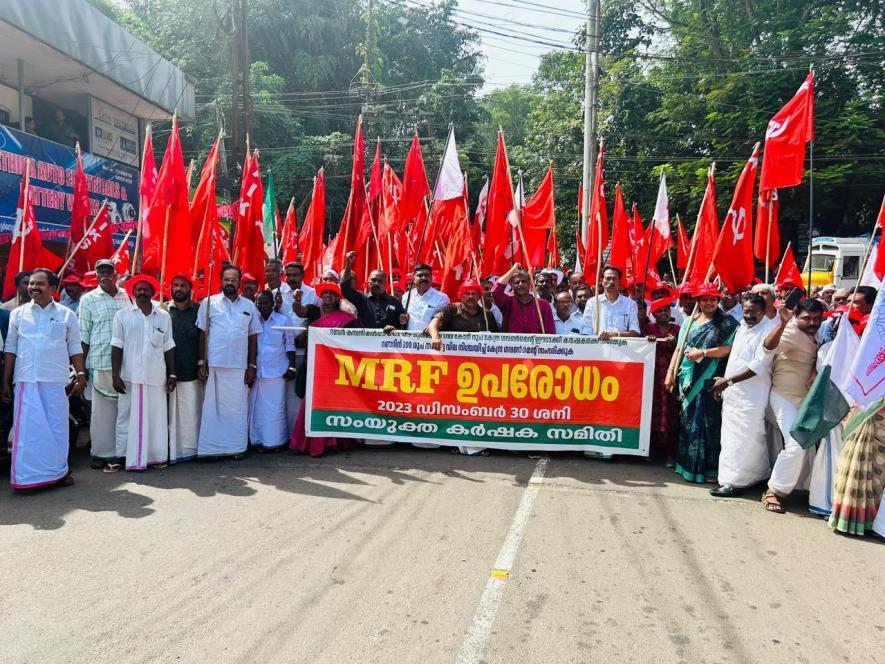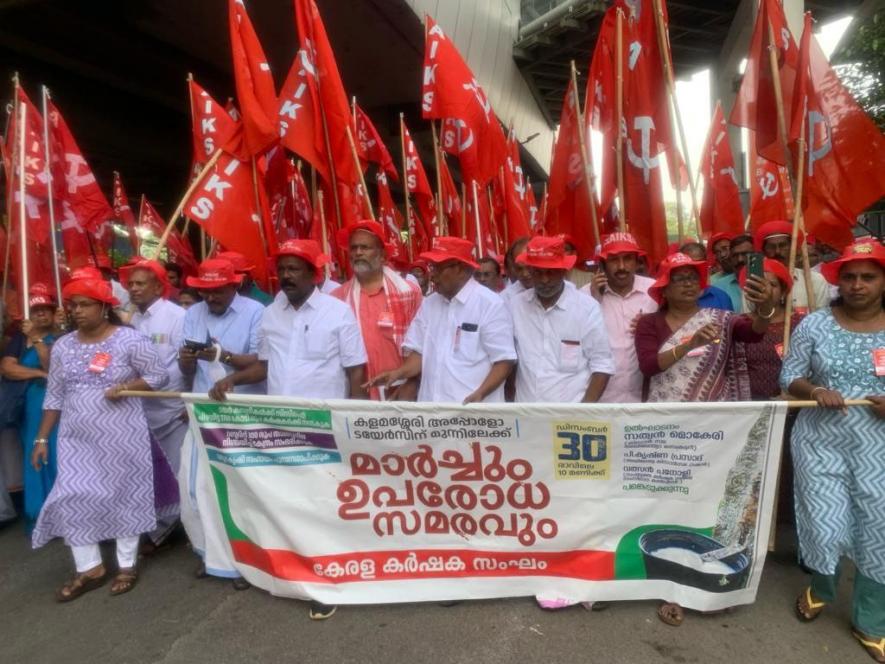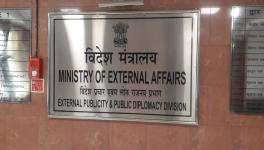Kerala: Rubber Farmers March to MRF, Apollo Tyres Against ‘Cartelisation, Robbing Farmers and Consumers’

Viju Krishnan, general secretary of AIKS, led the protest in Kottayam.
The Samyuktha Karshaka Samithi (a forum of 11 farmers' organisations) in Kerala marched to MRF and Apollo Tyres and attempted to lay siege against the “cartelisation of tyre manufacturing companies” affecting rubber farmers, tapping workers, and Micro, Small, and Medium Enterprises (MSME).
The Kisan Union in Kerala has accused the import policies of the Union government and the “cartel formed by tyre manufacturing companies” of affecting farmers and the economy of the state. Despite the falling price of rubber latex, the raw material for manufacturing tyres, the cost of tyres has steeply increased, leading to losses for farmers and consumers.
The farmers' organisations called for the march to the tyre manufacturing units of MRF and Apollo, the first such protest by the organisations in Kerala, after the continuous fall in prices and the failure of the union government to prevent cartelisation.
Thousands of farmers participated in the march, demanding the distribution of Rs 1,788 crore penalty levied by the Competition Commission of India (CCI) on the five tyre manufacturing companies for illegal cartelisation.
‘IMPORT POLICIES AFFECTING RUBBER SECTOR’
The joint platform of the farmers' organisations in Kerala has been continuously protesting against the falling prices of rubber, the failure of the Union government in ensuring a Minimum Support Price (MSP), increasing imports of compound rubber, and the cartelisation of corporate tyre manufacturing companies.
After the CCI imposed a fine of Rs 1,788 crores on the five major tyre manufacturers, namely, MRF Ltd, Apollo Tyres, CEAT Ltd, JK Tyres, and Birla Tyres in October 2018, the dispute is still pending in the Supreme Court based on the appeals of the manufacturing companies. The Automotive Tyre Manufacturers Association (ATMA), the forum of the manufacturing companies, was also fined Rs 8.4 lakhs.
The Kerala Karshaka Sangham, the state unit of the All India Kisan Sabha (AIKS), brought 10 other farmers' organisations under the joint platform to intensify the struggle against the “looting” by the tyre manufacturing companies.
Vijoo Krishnan, the general secretary of the AIKS, blamed the successive Union governments led by the Bharatiya Janata Party (BJP) and the Congress for the challenges faced by rubber farmers.
“The Free Trade Agreement with the ASEAN countries was concluded in 2009 by the Congress government leading to disastrous results for rubber farmers. The pro-corporate policies of the Narendra Modi-led BJP government at the centre are to blame for the plight of the farmers,” he told NewsClick.

P Krishnaprasad, finance secretary of AIKS, and Valson Panoli, state general secretary of AIKS, led the protest in Ernakulam.
Referring to the “cartel formed by tyre manufacturers”, he said, “This created a situation where tyre cartels could unleash unbridled exploitation of both farmers and consumers. Their activities have ensured that the domestic price of rubber is pulled down through imports and market manipulations. The class conflict between monopoly capital and the peasantry as a whole has clearly come to the fore.”
The steep fall in rubber prices, from around Rs 230 per kg in 2011 to Rs 120 now, continues to have a huge impact on small and marginal growers, around 90% of the growers falling under this category with less than two acres, the tapping workers, and the allied industry relying on rubber latex as the raw material.
The AIKS and other farmers' organisations are demanding the Union government to declare rubber as an agricultural crop and announce an MSP of Rs 350 per kg as per the formula proposed by the M S Swaminathan Commission, which was an electoral promise of the BJP in 2014.
IMPACT ON KERALA’S ECONOMY
With around 22% of the agricultural land being cultivated with rubber, the sector plays a major role in the economy of the state. Rubber is grown in around 8.27 lakh hectares with a total production of 9 lakh tonnes with a productivity of 1,472 kg per ha, down from 1,903 kg per ha in 2013. More than 12 lakh small, marginal, and middle farmers, 2 lakh tapping workers, 30,000 small traders, and lakhs of workers in allied industries depend on the sector.
The fall in prices directly impacts the economy of the state since it has been spurting economic activities. With the price almost falling by half in comparison to 2013, the tyre manufacturers are getting the raw material at a lower price but continue to increase the prices of tyres for vehicles. The money deserved by the lakhs of farmers and workers is falling into the pockets of corporate companies, including MRF and Apollo, which have their manufacturing plants in Kerala.
K N Ganesh, a renowned historian, accused the corporates of robbing the farmers.
“There are many people who raise concerns about borrowing by the government of Kerala. An increase in productivity and the price of agricultural products is an important factor since the repayment capacity increases with an increase in GSDP. Monopolisation to increase profits is against the development interests of the people of Kerala,” he wrote on Facebook.
The Left Democratic Front (LDF) government, spending around Rs 1,807 crores for the rubber stabilisation fund, with Rs 170 as the base price, has promised to increase the price to Rs 250 per kg.
“In sharp contrast, the BJP government has cut fertiliser subsidies and has not allocated anything in the last budget for price stabilisation or market intervention,” said Krishnan.
The rubber farmers have been hiding different forms of struggles since February 2022, including state-level conventions, day and night dharna in front of Raj Bhavan, long marches, vehicle jathas, and a parliament march.
“We are urging the Union government to effectively intervene in the market to ensure a fair price for rubber, reduced import, and distribution of the penalty of Rs 1,788 crores to the farmers. This march and siege of MRF and Apollo manufacturing units in the state are the first steps towards ending the corporate monopoly and cartelisation,” Krishnan said.
Get the latest reports & analysis with people's perspective on Protests, movements & deep analytical videos, discussions of the current affairs in your Telegram app. Subscribe to NewsClick's Telegram channel & get Real-Time updates on stories, as they get published on our website.
























